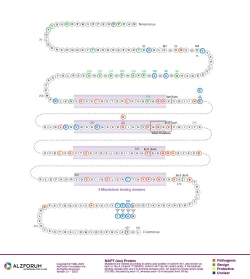Mutations
MAPT IVS9-10 G>T (g(-10)t)
Other Names: g(-10)t, c.823-10G>T
Quick Links
Overview
Pathogenicity: Frontotemporal Dementia : Pathogenic
Clinical
Phenotype: Frontotemporal Dementia, FTD-Parkinsonism
Reference Assembly: GRCh37/hg19
Position: Chr17:44087666 G>T
dbSNP ID: rs63749974
Coding/Non-Coding: Non-Coding
DNA
Change: Substitution
Expected RNA
Consequence: Splicing Alteration
Expected Protein
Consequence: Isoform Shift
Genomic
Region: Intron 9
Findings
This mutation was first described in two siblings who began to experience progressive cognitive decline, personality changes, and behavioral disturbances at ages 49 and 38. The mutation segregated with disease; it was present in their affected father but absent in two unaffected siblings. The variant is upstream of exon 10, 10 nucleotides into intron 9, and was designated g(−10)t (Malkani et al., 2006).
Subsequently, this mutation was found in a second, Irish family with a history of frontotemporal dementia and parkinsonism (Olszewska et al., 2021). Four of seven siblings and their father were affected, with behavioral changes evident by age 50. The proband—one of the affected siblings—was found to be a heterozygous carrier of the MAPT mutation (in this study, designated by its HGVS nomenclature, NM_005910.5:c.823-10G>T). Genotype data were not available from other affected family members. However, two siblings of the proband, unaffected at 62 and 77 years of age, do not carry the mutation.
Neuropathology
Neuropathological findings from two affected members of the second family have been reported (Olszewska et al., 2021).
Postmortem inspection of the proband’s brain confirmed premortem MRI findings of atrophy of the frontal and temporal lobes. Microscopic examination revealed a four-repeat (4R) tauopathy—with abundant tau-immunoreactive cytoplasmic inclusions in neurons and glia and neuropil threads throughout the brain. Immunostaining for 3R tau showed only occasional inclusions.
The brain of the proband’s brother showed atrophy of the hippocampus and temporal horn. Notably, this patient had received a diagnosis of motor neuron disease; gross examination showed asymmetry of the spinal cord and microscopic examination showed cell loss in the ventral horn. Immunostaining for 4R tau showed neuronal and astrocytic inclusions in the parahippocampal gyrus, substantia nigra, and locus coeruleus. Only rare inclusions were seen by immunostaining for 3R tau. Neurofibrillary tangles, Pick bodies, and Lewy bodies were not found.
Biological Effect
This point mutation is in an intronic region (IVS9) and strengthens the splice acceptor site such that exon 10 is preferentially included in mRNA transcipts, resulting in elevated 4-repeat (4R) tau isoforms (Malkani et al., 2006; Olszewska et al., 2021).
Last Updated: 25 Aug 2021
References
Paper Citations
- Malkani R, D'Souza I, Gwinn-Hardy K, Schellenberg GD, Hardy J, Momeni P. A MAPT mutation in a regulatory element upstream of exon 10 causes frontotemporal dementia. Neurobiol Dis. 2006 May;22(2):401-3. Epub 2006 Feb 28 PubMed.
- Olszewska DA, Fearon C, McGuigan C, McVeigh TP, Houlden H, Polke JM, Lawlor B, Coen R, Hutchinson M, Hutton M, Beausang A, Delon I, Brett F, Sevastou I, Seto-Salvia N, de Silva R, Lynch T. A clinical, molecular genetics and pathological study of a FTDP-17 family with a heterozygous splicing variant c.823-10G>T at the intron 9/exon 10 of the MAPT gene. Neurobiol Aging. 2021 Oct;106:343.e1-343.e8. Epub 2021 May 23 PubMed.
Further Reading
Learn More
Protein Diagram
Primary Papers
- Malkani R, D'Souza I, Gwinn-Hardy K, Schellenberg GD, Hardy J, Momeni P. A MAPT mutation in a regulatory element upstream of exon 10 causes frontotemporal dementia. Neurobiol Dis. 2006 May;22(2):401-3. Epub 2006 Feb 28 PubMed.
- Olszewska DA, Fearon C, McGuigan C, McVeigh TP, Houlden H, Polke JM, Lawlor B, Coen R, Hutchinson M, Hutton M, Beausang A, Delon I, Brett F, Sevastou I, Seto-Salvia N, de Silva R, Lynch T. A clinical, molecular genetics and pathological study of a FTDP-17 family with a heterozygous splicing variant c.823-10G>T at the intron 9/exon 10 of the MAPT gene. Neurobiol Aging. 2021 Oct;106:343.e1-343.e8. Epub 2021 May 23 PubMed.
Alzpedia
Disclaimer: Alzforum does not provide medical advice. The Content is for informational, educational, research and reference purposes only and is not intended to substitute for professional medical advice, diagnosis or treatment. Always seek advice from a qualified physician or health care professional about any medical concern, and do not disregard professional medical advice because of anything you may read on Alzforum.


Comments
No Available Comments
Make a Comment
To make a comment you must login or register.